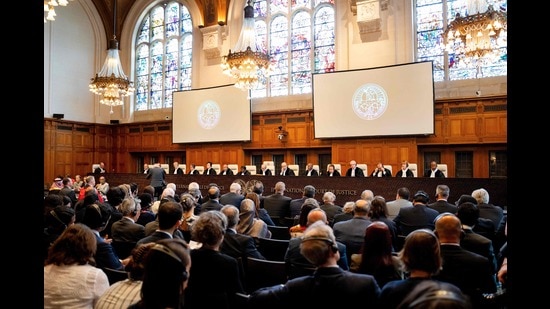Jul 31, 2024 08:42 PM IST
This case adds to the already momentous pressure on Israel to comply with its international law obligations.
The International Court of Justice (ICJ) recently delivered a historic decision on Israel’s occupation of the Palestinian territory in the Legal Consequences arising from the Policies and Practices of Israel in the Occupied Palestinian Territory, including East Jerusalem case. The ICJ held that Israel’s continued occupation of the Occupied Palestinian Territory (OPT) is a violation of international law and that Israel must withdraw from the OPT as rapidly as possible. In many ways, this verdict is a sequel to the decision rendered by the ICJ in 2004 in the famous Legal Consequences of the Construction of a Wall in the Occupied Palestine Territory (the Wall) case. In this case, the ICJ had opined that Israel’s construction of a wall on Palestinian soil cutting through Palestinian communities violated international law.

The present case can be called the Wall Plus decision, as international lawyer Marko Milanovic puts it. This case is due to the United Nations General Assembly invoking ICJ’s advisory jurisdiction in January 2023 and seeking its opinion on two questions: What are the legal consequences arising from the ongoing violation by Israel of the right of the Palestinian people to self-determination, from its prolonged occupation, settlement, and annexation of Palestinian territory occupied since 1967? And, how do the policies and practices of Israel affect the legal status of the occupation, and what are the legal consequences that arise for all States and the UN from this status?
In answering these questions, as an essential starting point, the ICJ held that the decisive criterion to determine if a territory is occupied under international law is whether the occupier exercises effective control, not just physical military presence. In 2004, Israel undertook unilateral disengagement by withdrawing its army from the Gaza Strip. Yet, the ICJ held that Israel continues to exercise effective control over the Gaza Strip and thus has obligations under the law of occupation.
Accordingly, the ICJ found that Israel, as the occupier, is bound by international human rights law (IHRL) in the OPT. A core component of IHRL is non-discrimination. The ICJ held that Israel’s actions as an occupying power to treat Palestinian people differently without any justification based on reasonable and objective criteria is discriminatory and a violation of IHRL. Specifically, Israel’s actions of a near-complete separation between the settlers and the Palestinian communities in the West Bank and East Jerusalem violate Article 3 of the International Convention on the Elimination of All Forms of Racial Discrimination, which prohibits racial segregation and apartheid. Despite this finding, intriguingly, the court did not use the term ‘apartheid’ and did not call Israel an ‘apartheid State’. The ICJ also declared illegal Israel’s settlement policies, such as the transfer of its civilian population to the West Bank and East Jerusalem, exploitation of Palestine’s natural resources, forced displacement of the Palestine population, and violence against Palestinians.
On the question of annexation of the OPT, the court held that under the law of occupation, the occupying power must exercise temporary control over the occupied territory. However, Israel’s conduct in the OPT, such as maintenance of settlements and construction activities, over the years, demonstrates its assertion of permanent control over the occupied territory. This amounts to annexation and violates the cardinal principle of international law of non-acquisition of territory using force. Moreover, the prolonged effect of Israel’s unlawful actions accentuates the violation of the right of the Palestinian people to self-determination.
The ICJ held that Israel’s abuse of its position as an occupying power and continued frustration with the Palestinian people’s right to self-determination triggers international responsibility. Thus, Israel is under an obligation to end its occupation as soon as possible. It must also provide full reparation, including returning land and seized immovable property since its occupation in 1967.
Another critical dimension of the case is the legal consequences for third States. The ICJ held that all countries are obliged not to recognise as legal the situation arising from Israel’s unlawful presence in the OPT. They should not render aid or assistance to Israel that helps it maintain its illegal presence in the OPT. One hopes the US and the other West European nations read this.
Though ICJ’s advisory opinions are not binding, they carry great legal and moral weight. Moreover, one should not lose sight of the larger global context in which this decision has been rendered. Israel and its leadership are already battling various court cases and are under incessant attack for violating international law. While no one accepts that Israel will put an end to its unlawful occupation of the OPT or even halt its ongoing military offensive, this case indeed adds to the already momentous pressure on Israel to comply with its international law obligations.
Prabhash Ranjan is a professor at the Jindal Global Law School and a Humboldt Fellow.The views expressed are personal


